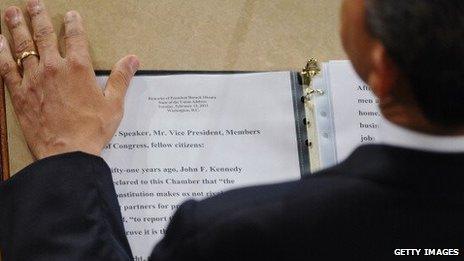State of the Union fatigue
- Published
- comments

Few Americans remember details about President Obama's 2013 address
The modern State of the Union address, arriving in the doldrums of winter, usually has all the interest and excitement of an annual performance review. This year's speech, coming as it does well into President Barack Obama's second term and delivered to a divided Congress that has shown little ability to pass legislation of any kind, has been met with even greater levels of ennui.
The president is mandated by the constitution to deliver messages to Congress on the state of the union "from time to time", but the public isn't mandated to watch it - and fewer and fewer Americans do. According to a HuffPost/YouGov poll, external, 55% of the US public doesn't plan to tune in to the speech, and only 9% said it was possible that what President Obama says could change their views.
The National Review's Kevin D Williamson tells us, external how he really feels:
The annual State of the Union pageant is a hideous, dispiriting, ugly, monotonous, un-American, un-republican, anti-democratic, dreary, backward, monarchical, retch-inducing, depressing, shameful, crypto-imperial display of official self-aggrandizement and piteous toadying, a black Mass during which every unholy order of teacup totalitarian and cringing courtier gathers under the towering dome of a faux-Roman temple to listen to a speech with no content given by a man with no content, to rise and to be seated as is called for by the order of worship — it is a wonder they have not started genuflecting — with one wretched representative of their number squirreled away in some well-upholstered Washington hidey-hole in order to preserve the illusion that those gathered constitute a special class of humanity without whom we could not live.
And that's just his first paragraph. He goes on to describe the event as "worse than the Oscars" and more nauseating than a pornographers' convention. He argues that the modern tradition glorifies the president as emperor and should be a more humble affair.
Jeff Shesol, a former speechwriter for President Bill Clinton, writes, external that the problem with State of the Union addresses is that they have become a grab-bag of policies "written by flash mob - a sudden aggregation, inside and around the speechwriting offices, of White House aides, Cabinet secretaries, pollsters, and college roommates of the President."
"The State of the Union address is rarely memorable," he contends. "How could it be? It's too shapeless to stick. For the first few minutes, the speech makes a stab at coherence - a theme (or a catchphrase) is introduced, a package of interrelated policies is presented. Then: entropy. (Which is an insult to entropy.)"
The Washington Post's George Will calls it, external "a tiresome exercise in political exhibitionism, the most execrable ceremony in the nation's civic liturgy, regardless of which party's president is abusing it".
Shesol writes that it doesn't have to be this way - President Obama and his speechwriters could break with the moribund tradition if they wanted to.
"Every President knows the elements of a good speech: a central proposition, an animating idea, a clear line of argument," he writes. "It states its purpose plainly and gets to the point. It eschews the inessentials. (And eschews words like 'eschews.') One day, a president will give a State of the Union like this - one that really defines the central challenge for the country, proposes credible solutions, and leaves everything else for other speeches on other days."
Peggy Noonan, a former speechwriter for President Ronald Reagan, agrees, external.
"The speechwriters know the answer is fewer applause lines, more thought, more humility and candor," she writes. "Americans aren't impressed anymore by congressmen taking to their feet and cheering. They look as if they have electric buzzers on their butts that shoot them into the air when the applause line comes."
The president has to say things that are "pertinent to the problems of the United States of America", she writes.
That's easier said than done, when the laundry-list style of delivery, complete with references to notable guests in the gallery and pre-packaged applause lines, has become the safe, proven norm, performed for the spectacle and not for the substance. In the HuffPost/YouGov poll, only 6% of respondents said they could remember last year's speech (technically not a State of the Union address) "very well".
That may be just how modern presidents like it. Promises unremembered often become promises unkept.
- Published29 January 2014
- Published27 January 2014